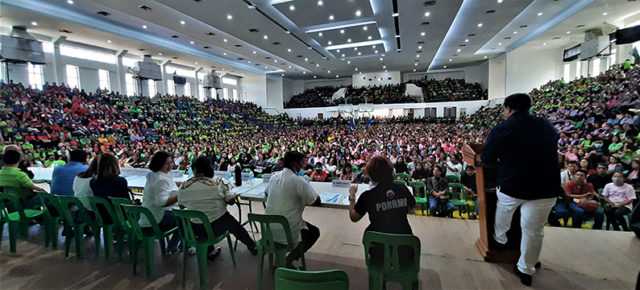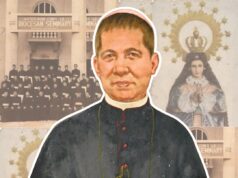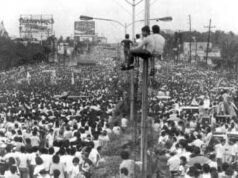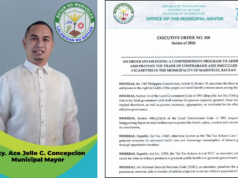HONORING HEROES. Gov. Dennis “Delta” G. Pineda declares before thousands of health workers that Pampanga has a place for the quarantine of overseas Filipino workers to be repatriated from nCoV-affected areas.
CITY OF SAN FERNANDO – “Kadugo po natin sila kaya bukas po ang Pampanga para sa kanila.”
Thus, Gov. Dennis G. Pineda opened Pampanga to overseas Filipino workers repatriated from areas affected by the novel coronavirus for the required 14-day quarantine period, if they are refused access by their local communities.
“They are hailed as heroes so they should be helped when they’re in need of help. I see this as a call of duty,” Pineda said, stressing that only OFWs and other Filipinos, not foreigners, can avail themselves of the quarantine services the provincial government offered.
He disclosed that the province has health facilities earlier constructed in coordination with the Department of Health that may serve well for isolation or quarantine purposes.
Pineda made his declaration, to thunderous applause, at Wednesday’s Health Summit: Strengthening Community Preparedness Against 2019-nCoV Through Proper Education and Information Dissemination.
A total of 3,608 barangay health workers (BHW) joined the summit in response to Pineda’s call to cascade down to the grassroots level correct information on nCoV, preventive measures like handwashing and coughing etiquette, and protocols to follow in suspected cases.
“You have a big role to play in our fight against nCoV,” Dr. Maria Eloisa Vidar, head of the communicable diseases cluster of the DOH in Central Luzon, told the BHW, as she and other health officials took turns orienting them about nCoV, its symptoms, prevention, and treatment.

NANAY CARES. Vice Gov. Lilia G. Pineda mobilizes barangay health workers to help in imparting nCoV preventive measures in their respective villages. Photos by Bong Lacson
At her turn to speak, Vice Gov. Lilia G. Pineda, under whose administration as governor the BHW was organized, made the call for “my beloved volunteers to be renewed in our compassionate duty to look for the sick in our communities, take them to the Capitol for their availment of our health programs and services.”
The BHW have volunteered to the task of tracking down suspected nCoV cases in their respective barangays, paying particular attention on residents coming home from recent travels primarily to China, Hong Kong, and Macau.
Pursuant to this, a local protocol has been established. It covers reporting the case to the municipal office that, in turn, takes the case to the provincial health office, which raises the case to the regional epidemiological surveillance unit (RESU) of the DOH. While basic case assessments are undertaken at each level, it is at the RESU that suspected carriers of the virus are swabbed for laboratory test, isolated, and treated.
The governor noted that the previous protocol on the nCoV concern was between hospitals and the RESU. “Now we have one that is barangay- based and involving our LGUs,” he said.
At the sidelines of the summit, Dr. Monserrat Chichioco, medical director of the Jose B. Lingad Memorial Regional Hospital, said the isolation room of the RESU in her hospital currently holds only seven persons under investigation. The results of their laboratory tests have not arrived yet, she added.
For her part, Vidar said there are, so far, no cases yet of local nCoV transmission, stressing: “What we have are imported ones.”





